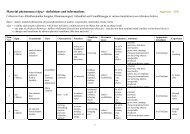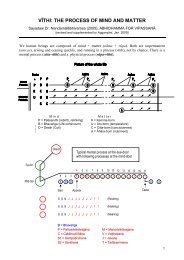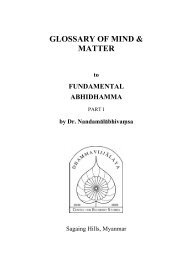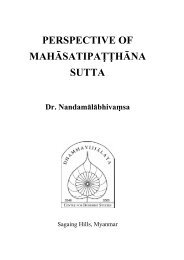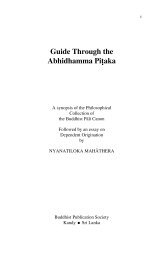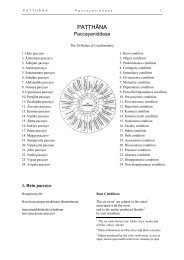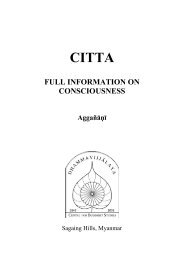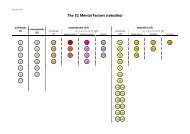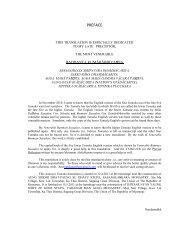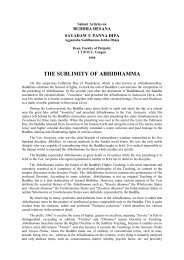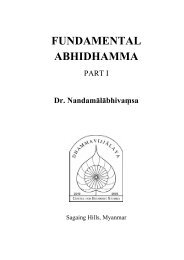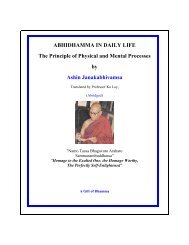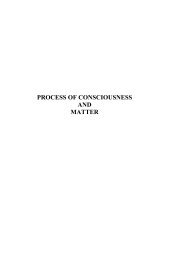Mahathera Ledi Sayadaw - Abhidhamma.com
Mahathera Ledi Sayadaw - Abhidhamma.com
Mahathera Ledi Sayadaw - Abhidhamma.com
Create successful ePaper yourself
Turn your PDF publications into a flip-book with our unique Google optimized e-Paper software.
Here is an illustration to show the difference between the vedayita-dukkha and bhayattha-dukkha.<br />
A man has a dangerous disease. He has to live on a simple diet, such as vegetables and fruit, so as<br />
to keep himself healthy and the disease in a subdued condition. If he takes rich diet, such as<br />
poultry, fish, meat, and confectionery, even though a sense of <strong>com</strong>fort and enjoyment may<br />
ac<strong>com</strong>pany such a dainty meal, after partaking of it he will suffer almost deadly pain for the<br />
whole of that day or maybe for many days from indigestion, which will cause to arise again in full<br />
force the disease that was subsiding. The more dainty the meal was, the longer will he suffer.<br />
Now suppose that a friend of his, with a view to acquiring merit, brings him some nicely cooked,<br />
buttered rice, fowl, fish, and meat. The man, fearing the agony of pain which he will undergo if he<br />
should eat of the meal so well prepared , though only for a few moments, has to thank his friend<br />
but decline it, telling him that the meal is too rich for him, and that should he partake of it he<br />
would be sure to suffer. In this instance, the richly prepared food is, of course, the pleasurable<br />
object (vedayitasukha-vatthu), for it will probably furnish a nice savour to the palate while it is<br />
being eaten, which feeling of pleasure is called Vedayitasukha. But to him who foresees that it<br />
will cause him such pain as may break down his health, this same food is really an unpleasurable<br />
object. He shrinks from and fears it, for he knows that the better the savour the longer he must<br />
sufffer; hence the pleasure his palate will derive from the food is to him a real fear-producing ill.<br />
ln the world, he who has not got rid of the error of Ego and be<strong>com</strong>e safe against the danger of the<br />
dispersion of life (vinipatanabhaya), and its passage to realms of misery, is like the aforesaid man<br />
who has the dangerous disease. The existences of men, Devas and Brahmas, and the pleasures<br />
experienced therein, are like the richly prepared food and the feeling of pleasure derived from it.<br />
The state of being reborn in different existences after death is like the agony which the man has to<br />
suffer after the enjoyment of the food.<br />
Here Vedayita-dukkha is synonymous with Dukkha-vedana which is present in the Vedana Triad<br />
of Sukhaya-vedanaya-sampayutta- dhamma, Dukkhaya - vedanaya-sampayutta-dhamma, and<br />
Adukkhamasukhaya-vedanaya-sampayutta-dhamma. Bhayattha-dukkha is synonymous with<br />
Dukkha-saccam and with Dukkham, which is present in the three salient features, Anicca, Dukkha,<br />
and Anatta.<br />
Hence, the perfect as well as the qualified knowledge of the intrinsic nature of the ill of the<br />
existences of men, Devas and Brahmas, as of the pleasures experienced therein, is called the<br />
Dukkha-parinna.<br />
Anatta-parinna means the perfect or the qualified knowledge of things mental and material as<br />
possessing the characteristic of No-soul." By this knowledge of things as no-soul, the Anattananna,<br />
all the mental and material phenomena that belong to the ultimate truths are discerned as<br />
having no-soul. By it also is discerned the non-personality of the "person" of conventional truth.<br />
Neither are persons and creatures discerned as the soul or personality of mental and material<br />
phenomena; nor is it discerned that there exists, apart from these, a soul or personality which<br />
never dies but transmigrates from one existence to another. If this knowledge attains to its highest<br />
degree, it is called Anatta-parinna. The triple Parinna (of' Anicca, Dukkha, and Anatta), is called<br />
Tirana-parinina.<br />
Pahana-parinna means the perfect or the qualified knowledge which dispels hallucinations. It<br />
dispels the three Nicca-vippallasas by means of the insight acquired through the contemplation of<br />
Impermanence, the three Sukha-vipallasas and the three Subha-vippallasas, by means of the<br />
insight acquired through the contemplation of Ill, and the three Atta-vippallasas by means of the<br />
insight acquired through the contemplation of No-soul.<br />
(Note by Translator.---Here the three Nicca-vippallasas are :-<br />
114. Anicce niccanti sannavippallaso,<br />
115. Anicce niccanti cittavippallaso



